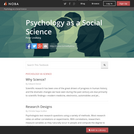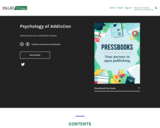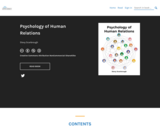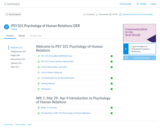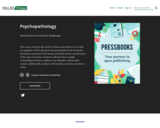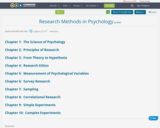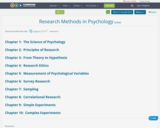3rd American Edition
Short Description:
This third American edition is a comprehensive textbook for research methods classes. It is an adaptation of the second American edition.
Long Description:
This textbook is an adaptation of one written by Paul C. Price (California State University, Fresno) and adapted by The Saylor Foundation under a Creative Commons Attribution-NonCommercial-ShareAlike 3.0 License without attribution as requested by the work’s original creator or licensee. The original text is available here: http://www.saylor.org/site/textbooks/
The first Canadian edition (published in 2013) was authored by Rajiv S. Jhangiani (Kwantlen Polytechnic University) and was licensed under a Creative Commons Attribution-NonCommercial-ShareAlike 3.0 License. Revisions included the addition of a table of contents, changes to Chapter 3 (Research Ethics) to include a contemporary example of an ethical breach and to reflect Canadian ethical guidelines and privacy laws, additional information regarding online data collection in Chapter 9 (Survey Research), corrections of errors in the text and formulae, spelling changes from US to Canadian conventions, the addition of a cover page, and other necessary formatting adjustments.
The second adaptation incorporated the second Canadian edition (published in 2013) by Rajiv S. Jhangiani (Kwantlen Polytechnic University) and I-Chant A. Chiang (Quest University Canada), licensed under a Creative Commons Attribution-NonCommercial-ShareAlike 4.0 International License. Major revisions included numerous new examples and links to outside resources throughout the book, references to replicability and open science (Chapters 1 and 13), and additions to discussions of validity (Chapters 5 & 6), the addition of a glossary of key terms, and numerous illustrations, descriptions, and exercises throughout.
The second American edition constituted a major revision for the first Canadian edition was the substitution of the original ethics chapter (Chapter 3) from the first American edition, and the reversion of Canadian spelling conventions to American spelling conventions.
Cover photo: “Great Wave off Kanagawa” after Katsushika Hokusai (葛飾北斎) is public domain.
The third U.S. edition was authored by Carrie Cuttler (Washington State University) in 2017 and is licensed under a Creative Commons Attribution-NonCommercial-ShareAlike 4.0 International License. Revisions in the current edition include general reorganization, language revision, spelling, formatting, additional video links, and examples throughout. More specifically, the overall model section was moved from Chapter 1 to Chapter 2, new sections were added to Chapter 1 on methods of knowing and goals of science, and a link on the replication crisis in psychology was added to Chapter 1. Chapter 2 was also reorganized by moving the section on reviewing the research literature to earlier in the chapter and taking sections from Chapter 4 (on theories and hypotheses), moving them to Chapter 2, and cutting the remainder of Chapter 4. Sections of Chapter 2 on correlation were also moved to Chapter 6. New sections on characteristics of good research questions, an overview of experimental vs. non-experimental research, a description of field vs. lab studies, and making conclusions were also added to Chapter 2. Chapter 3 was expanded by adding a definition of anonymity, elaborating on the Belmont Report (the principles of respect for persons and beneficence were added), and adding a link to a clip dispelling the myth that vaccines cause autism. Sections from Chapter 4 (on defining theories and hypotheses) were moved to Chapter 2 and the remainder of the previous Chapter 4 (on phenomenon, theories, and hypotheses) was cut. Chapter 5 was reorganized by moving the sections on four types of validity, manipulation checks, and placebo effects to later in the chapter. Descriptions of single factor two-level designs, single factor multi-level designs, matched-groups designs, order effects, and random counterbalancing were added to Chapter 5 and the concept of statistical validity was expanded upon. Chapter 6 was also reorganized by moving sections describing correlation coefficients from Chapters 2 and 12 to Chapter 6. The section of the book on complex correlation was also moved to Chapter 6 and the section on quasi-experiments was moved from Chapter 6 to its own chapter (Chapter 8). The categories of non-experimental research described in Chapter 6 were change to cross-sectional, correlational, and observational research. Chapter 6 was further expanded to describe cross-sectional studies, partial correlation, simple regression, the use of regression to make predictions, case studies, participant observation, disguised and undisguised observation, and structured observation. The terms independent variable and dependent variable as used in the context of regression were changed to predictor variable and outcome/criterion variable respectively. A distinction between proportionate stratified sampling and disproportionate stratified sampling was added to Chapter 7. The section on quasi-experimental designs was moved to its own chapter (Chapter 8) and was elaborated upon to include instrumentation and testing as threats to internal validity of one-group pretest-posttest designs, and to include sections describing the one-group posttest only design, pretest-posttest nonequivalent groups design, interrupted time-series with nonequivalent groups design, pretest-posttest design with switching replication, and switching replication with treatment removal designs. The section of Chapter 9 on factorial designs was split into two sections and the remainder of the chapter was moved or cut. Further, examples of everyday interactions were added and a description of simple effects was added to Chapter 9. The section on case studies that appeared in Chapter 10 was edited and moved to Chapter 6. Further, labels were added to multiple-baseline across behaviors, settings, and participants designs, and a concluding paragraph on converging evidence was added to Chapter 10. Only minor edits were made to the remaining chapters (Chapters 11, 12, and 13).
Year of Publication: 2017
Word Count: 119055
(Note: This resource's metadata has been created automatically by reformatting and/or combining the information that the author initially provided as part of a bulk import process.)
